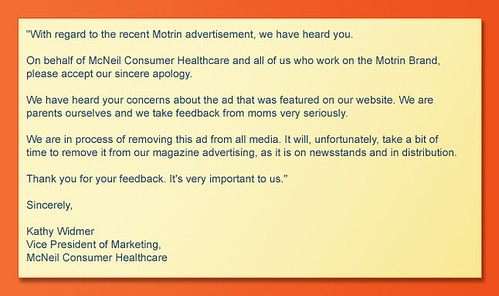An interesting story has erupted on the microblogging site Twitter. Apparently a large number of moms reacted strongly towards an online ad for the pain killer Motrin that was posted Saturday on the company’s website. The advert discusses the pain supposedly caused by carrying around babies in various types of slings.
http://www.youtube.com/watch?v=BmykFKjNpdY
The moms voiced their opinion on the Motrin ad campaign and tweeted their thoughts on Twitter using the tag “#motrinmoms” so that conversations easily could be tracked. Within 24 hours a video was also created, showing tweets and images of moms carrying their children – without pain.
The volume of comments on Twitter is so high that there currently are several tweets per minute about Motrin, which now is the highest ranked term on Twitter, #motrinmoms being in second place.
As is often the case nowadays, bloggers joined in and then traditional media too. This is an extremely interesting case and I am sure we will read more details in the coming days. But it might not be so bad in the end for Motrin. Tonight there is a message on the front page of Motrin.com that states that the company has listened to the negative feedback and pulled the ad. All in all, perhaps there can even be positive effects on Motrin as they get credit for listening to customers?
Tags: motrin, twitter, motrinmoms, twitter. Ping.

